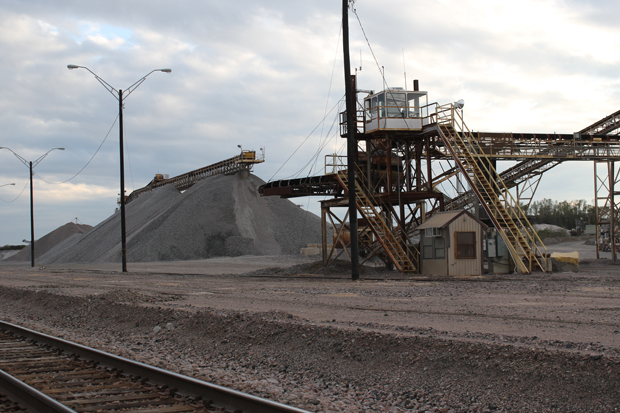
Piles of crushed limestone along railroad tracks near Mill Creek, Okla.
Logan Layden / StateImpact Oklahoma


Piles of crushed limestone along railroad tracks near Mill Creek, Okla.
Logan Layden / StateImpact Oklahoma

Logan Layden / StateImpact Oklahoma
Piles of crushed limestone along railroad tracks near Mill Creek, Okla.
Last week, StateImpact reported on what the passage of State Question 640 in 1992 did to tax policy in Oklahoma.
“You need to have a super-majority in the House and the Senate and the governor has to sign it,” Alexander Holmes, a Regent’s Professor of Economics at the University of Oklahoma, said. “I’m still betting that if you reduce the taxes, you can never make them go up again.”
But there there are ways around the tax-killing law, as the mining industry may be about to discover.
The key is in the wording. The text of State Question 640 requires big legislative majorities or a statewide vote for bills “intended to raise revenue for support of state government.” State government. The effort growing out of Johnston County in south-central Oklahoma has nothing to do with raising revenue for the state.
“The mines just continue to expand,” says Gary Green, whose ranch is near one of the mining operations.” We actually have a mine that’s from Germany that’s been trying to operate, more mines from Texas coming in.”
Green drives on county roads pockmarked by trucks loaded with limestone, and through clouds of dust thrown up by rock being crushed into gravel and sand.
“When I first came here, back to the west there were very few lights. It was dark. You could see the stars. Now when I drive in my driveway, back to the west, it looks like a small city from all the lights from the mines,” Green says.
It’s not that Johnston County residents want the out-of-state companies to leave — well, some do — but many agree they should be getting something more for sacrificing the county’s natural resources. District 2 Commissioner Mike Thompson is among them.
“We definitely need [the mining companies], and we’re not trying to run them out or nothing,” Thompson says. “We appreciate what they do, employment and everything. But we just would like to have our fair share that’s leaving the state.”
What they want is a new tax, a severance tax, on material mined in their county and then sent out-of-state. And they want to use the tax to fix roads and bridges.
This isn’t a new idea. Arkansas and several other states levy taxes on aggregate miners. Texas has a tax on concrete production.
But SQ 640’s restrictions remain. So when State Representative Charles McCall wrote the severance tax bill he’s pushing this session, he worded it very carefully.
“It allows the counties — if they so choose — to put it to a vote of the people within their counties,” McCall says. “Passage of this bill does not enact a tax. It is not a tax bill.”
Instead of the state imposing a tax, the bill authorizes counties to do so. That might get McCall around the limits of SQ 640. But it will be tough to authorize a new tax on business in one of the most conservative, anti-tax legislatures in the country.
“You just have to convey what the true intent of the bill is,” McCall says. “It’s nothing more than just punting it down to the local level. And I believe that the Republican caucus, specifically, is a caucus of local control.”
McCall is himself a Republican. So is Frank Simpson, who’s carrying the bill on the Senate side. Also, this session, for the first time, county commissioners from across the state are organized behind the effort.
And back in Johnston County, Gary Green says he’s sure how the people would vote.
“I think it’d be almost 100 percent,” Green says.
It sounds like all that should be enough to get state legislators to sign on, but last year a similar bill never made it for a full vote in the House or Senate.